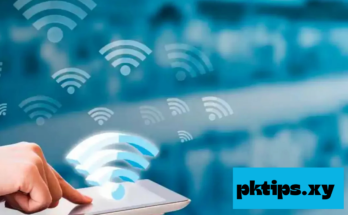In the modern digital era, connectivity has become an essential part of daily life. From browsing the web to streaming high-definition videos, people rely on fast and stable internet connections. The evolution of wireless technology has reached a groundbreaking milestone with the introduction of 5G technology. This next-generation mobile network is designed to revolutionize mobile connectivity, making data transmission faster and more efficient than ever before.
With 5G, users can expect ultra-fast speeds, low latency, and improved connectivity, which will not only enhance smartphones but also impact various industries, including healthcare, automotive, smart cities, and the Internet of Things (IoT). This article explores the ins and outs of 5G technology, its transformative potential, and key areas where it will make a significant impact.
What is 5G Technology?
5G (Fifth Generation) technology is the latest iteration of mobile networks that follows 4G LTE. It is engineered to provide:
- Ultra-fast data speeds (up to 10 Gbps)
- Lower latency (as low as 1 millisecond)
- Greater network capacity
- More reliable connections
- Better energy efficiency
Unlike previous generations, 5G operates on multiple frequency bands, including low-band, mid-band, and high-band (mmWave), to deliver faster and more reliable services.

Evolution of Mobile Networks
- 1G (1980s): Analog voice calls
- 2G (1990s): Digital voice and text messaging
- 3G (2000s): Mobile data and internet access
- 4G LTE (2010s): High-speed internet, HD video streaming
- 5G (2020s and beyond): High-speed connectivity, ultra-low latency, massive IoT connectivity
How 5G Technology Works
5G technology uses advanced network infrastructure, including small cells, beamforming, and massive MIMO (Multiple Input, Multiple Output), to improve efficiency. Here’s how it works:
- Millimeter Waves (mmWave): High-frequency waves that deliver gigabit speeds.
- Massive MIMO: Multiple antennas at base stations provide better connectivity.
- Network Slicing: Creates customized network slices for different applications.
- Edge Computing: Reduces network congestion and enhances real-time data processing.
With these advancements, 5G ensures faster and more stable connectivity than ever before.
How 5G Will Revolutionize Mobile Connectivity
1. Faster Internet Speeds
One of the most anticipated benefits of 5G technology is lightning-fast speeds. With speeds up to 100 times faster than 4G LTE, users can download large files, stream 4K/8K videos, and enjoy lag-free gaming.
2. Ultra-Low Latency
Latency, or the time it takes for data to travel from one point to another, is significantly reduced in 5G networks. With a latency as low as 1 millisecond, applications such as real-time gaming, autonomous vehicles, and remote surgeries become possible.
3. Enhanced IoT Connectivity
5G will power the Internet of Things (IoT), allowing billions of devices to communicate seamlessly. This is essential for:
- Smart homes (automated appliances, security systems)
- Smart cities (traffic management, energy efficiency)
- Industrial automation (robotics, remote monitoring)

4. Improved Mobile Experience
With 5G-enabled smartphones, users will experience smoother browsing, instant downloads, and seamless video calls. Applications such as augmented reality (AR) and virtual reality (VR) will also thrive.
5. Game-Changer for Businesses
Industries such as healthcare, manufacturing, and finance will benefit from 5G-powered AI, cloud computing, and automation. Businesses can leverage real-time data analysis and secure transactions.
Industries That Will Benefit from 5G
1. Healthcare
- Remote surgeries using robotic technology
- Telemedicine with real-time diagnosis and treatments
- Wearable health devices for continuous monitoring
2. Autonomous Vehicles
- Faster vehicle-to-vehicle (V2V) communication
- Self-driving cars with improved AI navigation
- Smart traffic control systems for reducing congestion
3. Smart Cities
- Efficient energy management
- AI-powered security surveillance
- Smart grids for optimized electricity distribution
4. Entertainment and Gaming
- Lag-free cloud gaming
- Realistic AR/VR experiences
- Enhanced live streaming capabilities
5. Industrial Automation
- AI-driven robotics in manufacturing
- Remote-controlled machinery for hazardous environments
- Supply chain optimization
Challenges of 5G Technology
1. Infrastructure Development
5G requires extensive network infrastructure, including small cell deployment and fiber-optic connections.
2. High Costs
Upgrading to 5G involves significant costs for telecom providers, businesses, and consumers.
3. Security Concerns
With more connected devices, cybersecurity threats and data privacy risks become critical.
4. Device Compatibility
Older devices will not support 5G networks, requiring users to upgrade smartphones and gadgets.
5G vs. 4G: A Quick Comparison
| Feature | 4G LTE | 5G |
|---|---|---|
| Speed | Up to 100 Mbps | Up to 10 Gbps |
| Latency | 30-50 ms | 1-10 ms |
| Connectivity | Limited IoT Support | Massive IoT Connectivity |
| Reliability | High | Ultra-Reliable |
| Application | Smartphones, Streaming | AI, AR/VR, Autonomous Vehicles |
5G Deployment Around the World
Several countries have already begun deploying 5G networks, including:
- United States – Major carriers like Verizon, AT&T, and T-Mobile are expanding coverage.
- China – Rapid nationwide rollout with companies like Huawei and China Mobile leading.
- South Korea & Japan – Early adopters with significant 5G infrastructure.
- Europe – Countries like Germany, the UK, and France are expanding 5G networks.

What’s Next for 5G?
With continuous advancements, 6G technology is already in early research stages, promising even faster speeds, AI-driven networks, and futuristic applications. However, for now, 5G remains the foundation for next-generation connectivity.
Final Thoughts
5G technology is not just about faster internet it is a transformative force that will redefine mobile connectivity. From faster speeds to real-time applications, 5G will power the digital future. As more regions adopt 5G, we can expect significant advancements in healthcare, automotive, entertainment, and smart infrastructure.
As we step into the 5G era, staying informed and preparing for its benefits will be essential for individuals and businesses alike.



